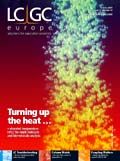Elevated Temperature HPLC: Principles and Applications to Small Molecules and Biomolecules
LCGC Europe
In this article the authors review the use of elevated temperatures in HPLC, and provide examples covering separations of both small molecules and biomolecules. Generic issues of temperature dependence of retention and plate height are discussed, and comparisons are made between temperature gradient and solvent gradient elution. They describe how the use of elevated temperatures allow good chromatographic efficiency to be obtained at flow-rates higher than those optimal at ambient temperature, thus increasing the speed of separation.
Polysorbate Quantification and Degradation Analysis via LC and Charged Aerosol Detection
April 9th 2025Scientists from ThermoFisher Scientific published a review article in the Journal of Chromatography A that provided an overview of HPLC analysis using charged aerosol detection can help with polysorbate quantification.
Removing Double-Stranded RNA Impurities Using Chromatography
April 8th 2025Researchers from Agency for Science, Technology and Research in Singapore recently published a review article exploring how chromatography can be used to remove double-stranded RNA impurities during mRNA therapeutics production.








